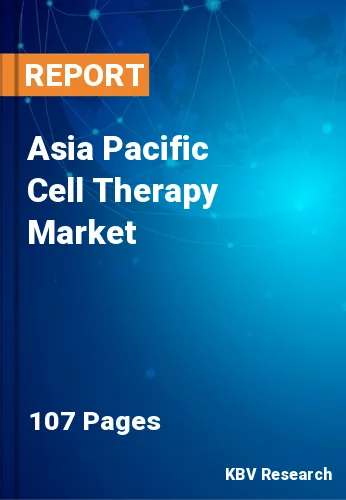The Asia Pacific Cell Therapy Market would witness market growth of 28.6% CAGR during the forecast period (2020-2026). The increasing number of clinical studies for cell-based therapies is boosting the growth of the market. This has brought considerable global funding in R&D and their clinical translation.
The rising number of ongoing clinical trials is the result of the existence of government and private funding agencies that are consistently providing investments to promote projects across several phases of clinical trials.
In addition, the gradual advent of the latest technologies to encourage the growth of advanced therapies has fuelled the growth of the market. The arrival of proprietary cell lines is regarded as the main medium by which a product can be used for the manufacturing of a robust portfolio of candidates. For instance, Immunicum employs Chimeric Antigen Receptor T cell (CAR-T) expansion, T-cell primers, and dendritic cell neoantigen presentation technology to promote their product offerings for immuno-oncology.
Precision medicine can be considered as a new method for disease treatment and prevention, which considers individual variability in genes, environments, and lifestyles. Precision medicine includes the selection of drugs completely suitable to a patient on the basis of disease condition and history. Though this practice is expanding into all disease regions, oncology has witnessed the most development. Precision medicine provides a new pattern in oncology, where a patient gets personalized treatment. This method to disease diagnosis, treatment, prevention uses a global view of patients – from their genes and their environment to their lifestyles, like CAR-T therapy, are some of the major development.
The China market dominated the Asia Pacific Hospitals & Clinics Market by Country 2019, growing at a CAGR of 27.8 % during the forecast period. The Japan market is showcasing a CAGR of 29.5% during (2020 - 2026). Additionally, The India market is poised to grow at a CAGR of 31% during (2020 - 2026).
The Stem Cell market dominated the Malaysia Cell Therapy Market by Cell Type 2019, thereby, achieving a market value of $118.1 million by 2026. The Umbilical Cord-Derived market is estimated to grow at a CAGR of 32.7% during (2020 - 2026). The Adipose-Derived Stem Cell market is experiencing a CAGR of 34.1% during (2020 - 2026). Additionally, The Non-Stem Cell market is expected to witness a CAGR of 33.3% during (2020 - 2026).
Based on Therapy Type, the market is segmented into Autologous and Allogeneic. Based on Therapeutic Area, the market is segmented into Malignancies, Autoimmune Disorders, Musculoskeletal Disorders, Dermatology and Others. Based on End User, the market is segmented into Academic & Research Institutes and Hospitals & Clinics. Based on Cell Type, the market is segmented into Stem Cell, Umbilical Cord-Derived, Adipose-Derived Stem Cell, Non-Stem Cell, Bone Marrow, Blood and Others. Based on countries, the market is segmented into China, Japan, India, South Korea, Singapore, Malaysia, and Rest of Asia Pacific.
Free Valuable Insights: Cell Therapy Market in Asia Pacific is expected to register a CAGR of 28.6% during the forecast period (2020-2026)
The market research report covers the analysis of key stake holders of the market. Key companies profiled in the report include Fujifilm Holdings Corporation, Smith & Nephew PLC, Kolon TissueGene, Inc., JCR Pharmaceuticals Co., Ltd., Medipost Co., Ltd., Stemedica Cell Technologies, Inc., NuVasive, Inc., Avantor, Inc., Vericel Corporation, and Pharmicell Co., Ltd.
By Therapy Type
By Therapeutic Area
By End User
By Cell Type
By Country
Our team of dedicated experts can provide you with attractive expansion opportunities for your business.

